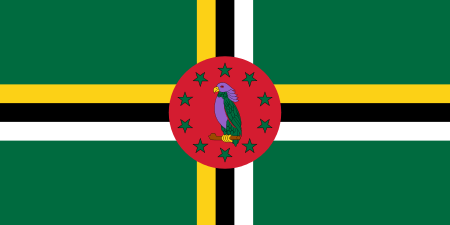Elections in Dominica
 |
| This article is part of a series on the politics and government of Dominica |
|
Executive |
| Administrative divisions (parishes) |
| Foreign relations |
Elections in Dominica have been taking place since 1832. Dominica elects on national level a legislature. The House of Assembly has 32 members, 21 members elected for a five-year term in single-seat constituencies, 9 appointed senators,[1] the Speaker and 1 ex officio member. a head of state - the president - is elected by the House of Assembly.
Dominica has a two-party system, which means that there are two dominant political parties, with extreme difficulty for anybody to achieve electoral success under the banner of any other party. Dominica was once a three-party system until the Dominica Labour Party and the greatly diminished Dominica Freedom Party formed a coalition government. The DFP has failed to acquire any seats for two elections straight, leaving the United Workers' Party as the only opposition to the DLP.
Latest elections
| Party | Votes | % | Seats | +/– |
|---|---|---|---|---|
| Dominica Labour Party | 23,208 | 56.99 | 15 | –3 |
| United Workers' Party | 17,479 | 42.92 | 6 | +3 |
| Independents | 37 | 0.09 | 0 | 0 |
| Invalid/blank votes | 471 | – | – | – |
| Total | 41,195 | 100 | 21 | 0 |
| Registered voters/turnout | 72,279 | 56.99 | – | – |
| Source: Electoral Office | ||||
Past elections
See also
Notes
- ↑ The elected Representatives decide whether senators are to be elected or appointed. If appointed, five are chosen by the president with the advice of the prime minister and four with the advice of the opposition leader. If elected, it is by vote of the Representatives.
References
- Matthias Catón: "Dominica" in: Elections in the Americas. A Data Handbook, vol. 1, ed. by Dieter Nohlen. Oxford University Press, Oxford, 2005: pp. 223–237 ISBN 0-19-928357-5